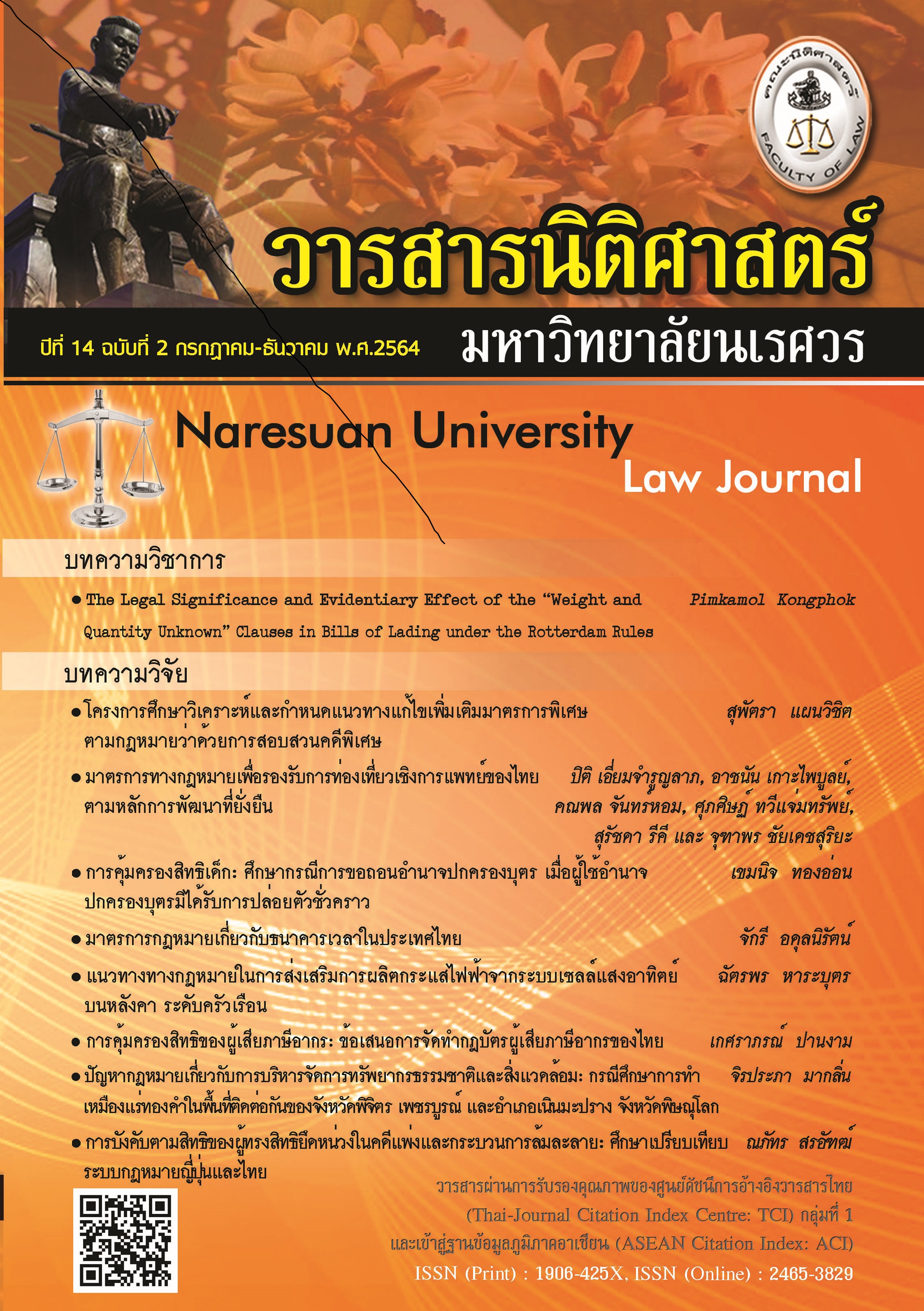แนวทางทางกฎหมายในการส่งเสริมการผลิตกระแสไฟฟ้า จากระบบเซลล์แสงอาทิตย์บนหลังคา ระดับครัวเรือน
Main Article Content
บทคัดย่อ
บทความวิจัยนี้มีวัตถุประสงค์ที่จะศึกษาและวิเคราะห์แนวทางทางกฎหมายในการส่งเสริมการผลิตกระแสไฟฟ้าจากเซลล์แสงอาทิตย์บนหลังคาในระดับครัวเรือนในประเทศไทย โดยศึกษาเปรียบเทียบมาตรการทางกฎหมายในการส่งเสริมการผลิตกระแสไฟฟ้าจากเซลล์แสงอาทิตย์บนหลังคาในต่างประเทศ ได้แก่ ประเทศเยอรมนี ประเทศสาธารณรัฐประชาชนจีน และประเทศมาเลเซีย เพื่อวิเคราะห์แนวทางในการกำหนดมาตรการทางกฎหมายที่จำเป็นในอันที่จะจูงใจให้ภาคประชาชนเข้ามามีส่วนร่วมในการผลิตกระแสไฟฟ้าจากระบบเซลล์แสงอาทิตย์บนหลังคาอย่างยั่งยืนมากขึ้น จากการศึกษา พบว่า ประเทศไทยควรทำการทบทวนและปรับปรุงกรอบกฎหมายและระเบียบข้อบังคับสำหรับส่งเสริมการผลิตกระแสไฟฟ้าจากเซลล์แสงอาทิตย์บนหลังคา ในระดับครัวเรือน อันจะช่วยหลีกเลี่ยงความขัดแย้งระหว่างหน่วยงานของรัฐและดึงดูดการลงทุนภาคเอกชน กฎระเบียบที่ดีจะช่วยให้เกิดความยืดหยุ่นในการขายหรือปรับโครงสร้างการลงทุน นอกจากนี้ ควรทบทวนกระบวนการในการขอใบอนุญาตเพื่อความโปร่งใสมากขึ้น และกฎระเบียบ เพื่อการส่งเสริมการผลิตกระแสไฟฟ้าจากเซลล์แสงอาทิตย์บนหลังคาควรบัญญัติเป็นกฎหมายเฉพาะเพื่อให้เกิดการพัฒนาที่ยั่งยืน
Article Details
เอกสารอ้างอิง
Asia-Pacific Economic Cooperation. Peer Review on Low Carbon Energy Policies in Malaysia (Final report). N.p.: APEC Energy Working Group, Asia-Pacific Economic Cooperation, n.d.
Department of Alternative Energy Development and Efficiency. Alternative Energy Development Plan: AEDP 2018-2037. Bangkok: Department of Alternative Energy Development and Efficiency, 2018. [in Thai]
Energy Policy and Planning Office (2018). Power Development Plan: PDP 2018-2037. Bangkok: Energy Policy and Planning Office, 2018. [in Thai]
Federal Ministry for the Economic Affairs and Energy (BMWi). Bundesbericht Energieforschung. Germany: Federal Ministry for the Economic Affairs and Energy, 2013, 2014, 2015.
Federal Ministry for the Economic Affairs and Energy (BMWi). Forschungsförderung für die Energiewende. Germany: Federal Ministry for the Economic Affairs and Energy, 2014.
Office of Natural Resources and Environmental Policy and Planning. “Thailand’s Intended Nationally Determined Contribution (INDC).” Accessed January 15, 2019. https://www4.unfccc.int/sites/ndcstaging/PublishedDocuments/Thailand%20First/Thailand_INDC.pdf.
Sustainable Energy Development Authority Malaysia. “The National Renewable Energy Policy and Action Plan (Malaysia).” Accessed May 2, 2021. http://seda.gov.my/
?omaneg=00010100000001010101000100001000000000000000000000&s=31
The IEA-PVPS. “National Survey Report of PV Power Applications in China (Report, 2019).” Accessed May 2, 2021. https://iea-pvps.org/wp-content/uploads/2020/09/NSR_China_2019.pdf.


